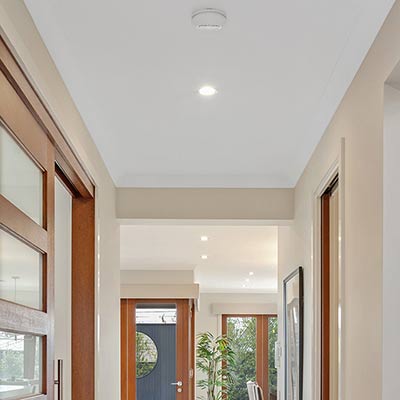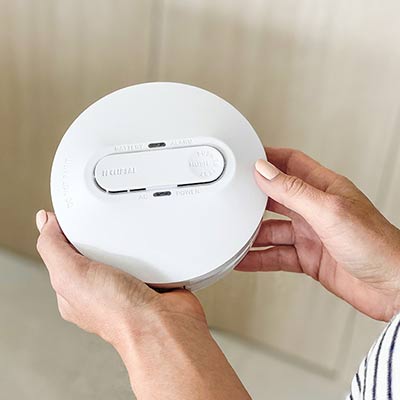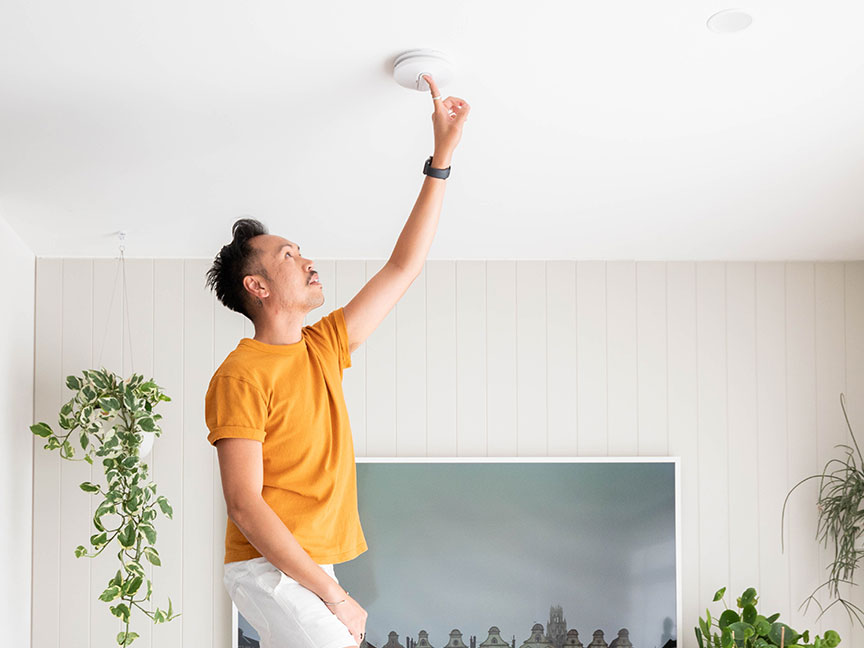
Smoke Alarms Help Save Lives
Homes can burn to the ground in less than 15 minutes.
Early warning alarms like interconnected photoelectric smoke alarms can give you and your family the best chance of escape.
Photoelectric Alarms
A smoldering fire is the most common and high-risk fire in the home. Wiser® and Fire Tek® Photoelectric smoke alarms reliably detect smoke from such fires, before it becomes flaming and potentially impossible to escape.

Interconnected Smoke Alarms
Our Wiser® and Fire Tek® smoke alarms can be interconnected wired or wirelessly. This ensures if one alarm detects smoke, all alarms activate. Providing greater warning if far away from detecting alarm in larger homes or bedrooms.

Every Month
Test your smoke alarm using the test/hush button and check the batteries with mains power switched off. Clean the alarm by removing dust and insects.

Every Three Months
Vacuum smoke alarms. Spray insect repellent on a cloth and wipe the ceiling around the smoke alarm. Test the smoke alarm after cleaning.
-1.jpg.aspx?width=400&height=400&ext=.jpg&ext=.jpg)
Every Year
Replace the back-up battery annually. Choose a recurring date that’s easy to remember (birthdays, end/start of daylight saving).
-1.jpg.aspx?width=400&height=400&ext=.jpg&ext=.jpg)
Every 10 Years
All smoke alarms have a limited service life of 10 years. After that period, the entire smoke alarm unit must be replaced with a new one.

New Zealand Building Code Update: Mandatory Smoke Alarm Requirements
The existing building code of New Zealand requires any type of smoke alarm to be installed in every escape route (hallway) and within three metres of every sleeping space door. Smoke alarms were not required to be interconnected.
However in November 2023 the New Zealand Building code (C/AS1) was updated, with all changes to be mandatory from November 1st 2024 onwards. These changes are citing NZS 4514:2021, which requires the following for new built homes and substantial renovations:
- Smoke alarms must all be interconnected with one another through a wired or wireless mechanism.
- Smoke alarms must be installed in all bedrooms, living spaces, hallways and landings on every level of the home.
- Smoke alarms need to be powered by: 230V mains, or from a 230V external power supply, or long life 10 year sealed‑in lithium battery.

For Rental Properties
- According to the RTA (Residential Tenancies Act) smoke alarms must be installed within 3 meters of each bedroom door or in every room where a person sleeps, on each level of a multi-storey home, and in all rental homes, boarding houses, rental caravans, and self-contained sleep-outs.
- All new smoke alarms must be photoelectric, have a battery life of at least eight years or be hard-wired, installed according to the manufacturer’s instructions, and meet international standards.
- Existing smoke alarms do not need to be replaced if they are working and have not passed the expiry date.
- Landlords and tenants are responsible for maintaining smoke alarms.
- Landlords must ensure smoke alarms are working at the start of each new tenancy and remain in working order during the tenancy.
- If landlords or tenants don’t meet their obligations, they could face financial penalties.

Find a local electrician
Your local qualified electrician will help ensure your home is protected from electrical hazards. Book an inspection today!

Showrooms
The best way to experience what PDL home electrical products can do is to see them in action. Visit our Auckland or Christchurch PDL Showroom today.

Smoke Alarm FAQs
Smoke alarm beeping? Looking for answers? Explore our Smoke Alarm FAQs

Smoke Alarm Range Brochure
Explore our range of Smoke Alarms.
